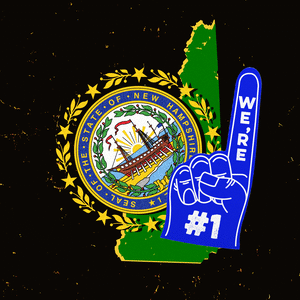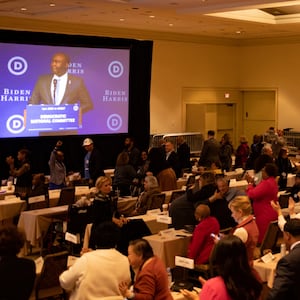Americans are about to dabble in a split-screen presidential primary for the first time—and no one knows exactly how it will all work out.
It might not be as much of a nightmare to follow as the 2020 Iowa caucuses, but American presidential elections are about to undergo either a one-off oddity, or the biggest reorganization to the presidential primary calendar since 1968.
The dramatic changes stem from the Democratic National Committee’s decision to shake up the order of the primaries. But, according to Derek Muller, a leading election law professor at University of Iowa College of Law, the changes hinge on two key factors.
The first is whether President Joe Biden runs unopposed in 2024. That possibility is looking increasingly likely—meaning the order of the Democratic primaries wouldn’t actually matter that much this cycle. The DNC’s calendar is only on the books for 2024, with the party set to re-examine its primary process for 2028 and onwards.
And if this 2024 calendar—whatever it shakes out to be—is just a one-off, then the process could very well turn into a quadrennial bidding war among states. That would be the second key factor that Muller said would lead to “the most transformative shakeup since 1968.”
A constantly shifting calendar would present some challenges for Democrats. Say what you will about the current system where Iowa and New Hampshire always get to go first, but Democratic candidates and consultants know how to run that sort of race.
“I’m a big fan of people working in environments that they actually know and understand,” one Democratic strategist told The Daily Beast, requesting anonymity to candidly discuss how the consultant class is navigating the new split calendar.
This strategist said a constantly changing calendar might actually disadvantage New Hampshire more than one where the Granite State goes a little later in the year. And it would hurt much of the “consultant class that knew the state inside and out.”
The time between 2024 and 2028 will be when strategists and their firms make any long-term shifts, with the gap being “a lifetime for consultant politics,” this strategist continued.
Then there’s the issue of so-called rogue primaries and any punishment the parties may dole out. For Democrats, it’s New Hampshire causing most of the problems, while the Republicans may have their hand forced by Michigan’s newly minted Democratic majority in both chambers of the state legislature. The Michigan Senate already moved up the primary date to comply with the DNC.
Unless Republican Gov. Chris Sununu—himself a likely GOP presidential candidate in 2024—and the Republican majorities in the New Hampshire statehouse suddenly change their minds and give the DNC what it wants, the Granite State won’t be able to comply.
"We’re waiting to hear what kind of penalties there will be, but the reality is, there is nothing we can do to prevent them," New Hampshire Democratic Party chair Raymond Buckley told The Daily Beast. "Our only concern is that the penalties should not punish our 2024 candidates. NH’s governor and state Republican majority leaders have already expressed their unwillingness to change our state law, and the Secretary of State has made clear that he’s going to follow the state law and make our primary first."
Unlike most other states, New Hampshire’s secretary of state oversees the presidential primary elections, and state law has enshrined the right to hold a primary before anybody else into the state constitution.
So what happens when Republicans hold their primary before the Democrats kick off their race in South Carolina in February 2024? As long as a candidate pays the $1,500 filing fee, they can make it onto the ballot for the first and “true” New Hampshire primary under the Democratic column.
Former presidential candidate Marianne Williamson has already said an upcoming return to the Granite State would give her “a more informed decision” over her political future. Democratic operatives have voiced concerns that a candidate like her could camp out in New Hampshire and draw attention in an unsanctioned “rogue primary.”
As far as possible punishments from the DNC go, nothing has been specified yet beyond anxieties, previously reported by The Daily Beast, of Delaware usurping New Hampshire on the calendar. That move looks increasingly unlikely now that the committee has ratified the calendar order and states have been given an extension until June to comply.
“How do they wanna penalize New Hampshire, which has a law in the books saying they have to go first, and just essentially flatly ignoring what Democrats do?” Muller said. “Are they gonna really hold fast to a penalty when they get to the convention in 2024?”
A source familiar with the back-and-forth said the DNC has yet to name sanctions for the NHDP, leaving the state party guessing.
Muller cited the only remotely recent precedent, from 2008, when the Hillary Clinton and Barack Obama campaigns split on Florida and Michigan having unsanctioned primaries. Initially, the DNC threatened to dock 50 percent of the delegates from both states if they didn’t comply. But by the time it was clear Obama would win the nomination, he ended up getting all of the delegates anyway.
“It’s a harsh penalty, but it’s not consequential if it’s not gonna be a close election,” Muller said of a possible delegate knock to New Hampshire, which Granite State Democrats have said they’re prepared for. “Then again, it’s consequential for the New Hampshire Democratic Party.”
Representatives for the DNC did not return a request for comment.
Looking beyond the relatively minute delegate math, a perpetual bidding process for the DNC’s calendar could have ripple effects in the staffing of campaigns for years to come.
“The other thing that's really gonna shift is the color, for lack of a better term, of who your early consultants are,” the Democratic strategist said. “Because if you are going to pick a lot of Iowa and New Hampshire people, it does mean that you have mostly white staffers who pick up the early wins, and then that helps them shoot up the ranks within a campaign structure or within a party infrastructure. So I think it will also lend itself to more diversity within.”
For scholars like Muller, the shifting landscape provides almost too much material to delve into.
“I mean, there's all kinds of questions that happen. Now maybe we in Iowa, we are left out in the cold altogether,” he said. “But when you add these other changes, yeah, definitely one of the bigger shakeups.”







